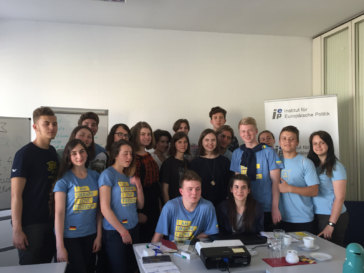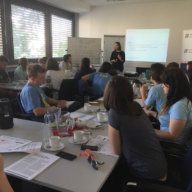IEP workshop on intercultural competencies with students from the Ukrainian Leadership Academy

On 17 May 2017, the Institute for European Politics (IEP) received 20 students from the ‘Ukrainian Leadership Academy’ in Kyiv, for a workshop on intercultural competencies.
The purpose of this academy is to offer Ukrainian graduates an alternative education system, consisting of a 10 months program, and preparing them for a position as future leaders. The concept was originally established in Israel. In Ukraine, it is supported mainly by the American organisation ‘Western NIS Enterprise Fund’ and other international as well as Ukrainian promoters.
The meeting in Berlin took place in the format of an interactive workshop on ‘Intercultural Competencies as an Integral Part of a Successful Communication’, and was held by Ljudmyla Melnyk, research associate at the IEP. The workshop aimed at improving the student’s intercultural sensitivity, which permits them to deal with cultural heterogeneity in a constructive way.
As primary associations with German culture the young Ukrainians named ‘punctuality, philosophy, individualism, variety, sausages and beer’, but also ‘a lack of humour’ and ‘emotional coldness’. With regard to their own culture on the other hand, they named associations such as ‘creativity, tradition, hospitality, start-ups’ and ‘a lack of punctuality’. It is essential to confront young people with their cultural stereotypes, and sensitise them to recognizing patterns of thinking that are based on clichés. A number of participants declared during the workshop that their image about Germany had been completely different prior to their arrival to Berlin, and that it has changed following their stay. They expressed the wish to discover more about the culture of this country.
The workshop additionally covered the issue of intercultural communication and addressed barriers that can serve as an obstacle to it. “It is essential to be aware of cultural differences and the general context in order to timely uncover barriers and oppose them. Being aware of these differences facilitates detecting causes for interpersonal conflicts and helps in resolving them. One example of a cultural difference between Germany and Ukraine is the planning-tradition. Whereas Germans tend to plan on a long term basis, Ukrainians adopt a rather spontaneous planning behaviour. Without this knowledge, misunderstandings can easily occur,” says Ljudmyla Melnyk.
The IEP-workshop marked the end of a three days’ stay of the Ukrainian Leadership Academy in Berlin. The study trip was organised on the occasion of the 25th anniversary of diplomatic relations between Ukraine and the European Union.

